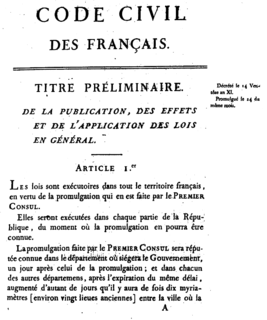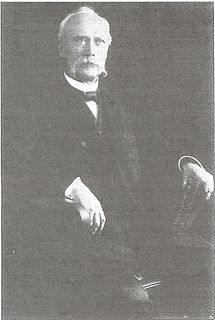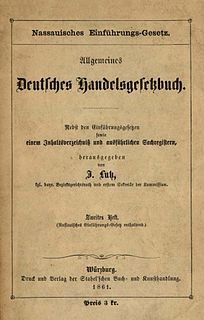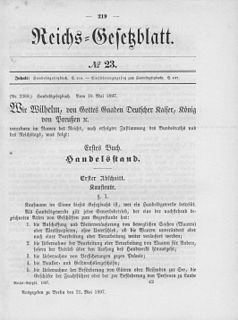Related Research Articles
The Bürgerliches Gesetzbuch, abbreviated BGB, is the civil code of Germany. In development since 1881, it became effective on 1 January 1900, and was considered a massive and groundbreaking project.
As in most countries, Germany has a standard way of citing its legal codes and case law; an essentially identical system of citation is also used in Austria.
The Codex Maximilianeus bavaricus civilis was a civil code enacted in the Electorate of Bavaria in 1756. It was drafted entirely by the Bavarian chancellor, Wiguläus von Kreittmayr, and was named after Maximilian III Joseph. Written in German, it nonetheless included many Latin phrases. In its content, it adhered to the Usus modernus Pandectarum more strongly than later codification projects. It remained in force in Bavaria until the enactment of the German Bürgerliches Gesetzbuch (BGB) on January 1, 1900.

A holographic will, or olographic testament, is a will and testament which is a holographic document, i.e., it has been entirely handwritten and signed by the testator. Traditionally, a will had to be signed by witnesses attesting to the validity of the testator's signature and intent, but in many jurisdictions, holographic wills that have not been witnessed are treated equally to witnessed wills and need only to meet minimal requirements in order to be probated:

An eingetragener Verein, abbreviated e. V., is a legal status for a registered voluntary association in Germany. While any group may be called a Verein, registration as eingetragener Verein confers many legal benefits, because it confers the status of a juridical person rather than just a group of individuals. The legal status must be mentioned in the name as well. Like certain other corporate bodies, a eingetragener Verein can apply for the status of a charitable organization (Gemeinnützigkeit).

A code of law, also called a law code or legal code, is a type of legislation that purports to exhaustively cover a complete system of laws or a particular area of law as it existed at the time the code was enacted, by a process of codification. Though the process and motivations for codification are similar in different common law and civil law systems, their usage is different.
The law of Germany, that being the modern German legal system, is a system of civil law which is founded on the principles laid out by the Basic Law for the Federal Republic of Germany, though many of the most important laws, for example most regulations of the civil code were developed prior to the 1949 constitution. It is composed of public law, which regulates the relations between a citizen/person and the state or two bodies of the state, and the private law, (Privatrecht) which regulates the relations between two people or companies. It has been subject to a wide array of influences from Roman law, such as the Corpus Juris Civilis, to Napoleonic law, such as the Napoleonic Code.
Laws regulating nonprofit organizations, nonprofit corporations, non-governmental organizations, and voluntary associations vary in different jurisdictions.
The Volksgesetzbuch was the attempt of Third Reich jurists in the Akademie für deutsches Recht to replace the Bürgerliche Gesetzbuch by a civil law code aligned with the principles of National Socialism.
The abstract system of title transfer is a legal term in German law relating to the law of obligations (Schuldrecht) and property law (Sachenrecht). Although no express reference to it is made in the German Civil Code (BGB), the concept of separating a personal undertaking to pay or exchange goods or legal rights from the conveyance of title to those goods or legal rights is fundamental to German private law.

German company law (Gesellschaftsrecht) is an influential legal regime for companies in Germany. The primary form of company is the public company or Aktiengesellschaft (AG). A private company with limited liability is known as a Gesellschaft mit beschränkter Haftung (GmbH). A partnership is called a Kommanditgesellschaft (KG).
Zivilprozessordnung (ZPO) is the German code of civil procedure. It was enacted in 1887. It strongly influenced the Code of Civil Procedure in Japan and Taiwan.
German labour law refers to the regulation of employment relationships and industrial partnerships in Germany.
Rudolf Arnold Nieberding was a German jurist and politician.
Events in the year 1897 in Germany.

Gotthold Julius Rudolph Sohm was a German jurist and Church historian as well as a theologian. He published works concerning Roman and German law, Canon law and Church History.

The Allgemeines Deutsches Handelsgesetzbuch was the first comprehensive commercial code in Germany. The term "Allgemein" (General) emphasized the whole German Confederation as the scope of application.

The Handelsgesetzbuch contains the core of the commercial law in Germany. It regulates the legal relations of merchants and therefore it is also designated as "the special private law for merchants".

The Prostitution Act is a federal law in Germany that regulates the legal status of prostitution as a service in order to improve the legal and social situation of prostitutes. The law was promulgated on 20 December 2001 and has been in force since 1 January 2002. At the same time the Strafgesetzbuch §180a and §181a (pimping) were amended so that the creation of an adequate working environment is no longer punishable as long as no exploitation of prostitutes takes place.
References
- ↑ Section §21 of the German Civil Code or "Bürgerliches Gesetzbuch(BGB)" - Dejure.org
- ↑ Section §1 of the German Cooperative Society Act or "Genossenschaft Gesetz(GenG) - Dejure.org
- ↑ Section §17 of the German Cooperative Society Act or "Genossenschaft Gesetz(GenG) - Dejure.org
- ↑ Section §2 of the German Commercial Law Act or "Handelsgesetzbuch (HGB)" - Dejure.org